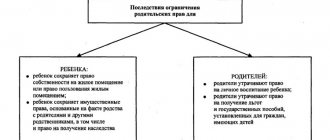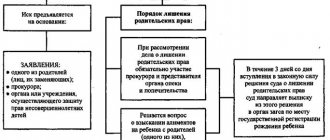Restoration of parental rights after deprivation can only take place if the parent(s) themselves want it. At the same time, a thorough check of the child’s living conditions in the family will be carried out and a proper conclusion will be made. If it is confirmed that the parent has changed his lifestyle and attitude towards the child, the court will return his rights.
To submit to the court, you will need a package of documents confirming the basis for the restoration of rights. Moreover, in each specific case, the documents may differ, so it is better to contact a professional lawyer who will prepare a portfolio.
Procedure for returning parental rights
At the first stage, the parent needs to submit an application to the court with a request to restore parental rights. A claim cannot be filed by relatives or guardianship authorities - only by the parent himself and at his own request. In Art. 72 of the Family Code of the Russian Federation (FC RF) spells out the entire process of restoring parental rights. The question may concern only minor children in need of education.
The main goal of restoring rights will be to meet the needs and desires of the child. According to the law, if he is 10 years old, he can decide his own fate - whether to agree or not to the return of his father (mother) to the family. The issue is considered at a court hearing with the participation of the prosecutor and guardianship authorities.
The process consists of the following steps:
- The parent fills out an application with a request to restore his parental rights.
- He writes an appeal to the guardianship council for assistance.
- A commission of representatives of the guardianship authorities checks the living conditions of the child in the family.
- The person deprived of his rights prepares a package of documents and submits a statement of claim to the court.
- Further, at the court hearing, the father (mother) confirms his intention to restore the rights to the child.
- The same court may also consider a request to return a minor from an orphanage to his family.
Where to file a claim
Deprivation of parental rights, as well as restoration, is carried out exclusively in court. This category of cases is considered by courts of general jurisdiction, that is, district and city courts. The rules of territorial jurisdiction are established by Chapter 3 of the Code of Civil Procedure of the Russian Federation (Civil Procedure Code of the Russian Federation).
It is important to know!
As a general rule, cases of deprivation of parental rights are considered
at the place of official and permanent registration (registration) of the defendant, which does not always coincide with the real (actual) place of residence.
In the case where it is unknown where the child’s parent lives or such parent does not live on the territory of the Russian Federation, being a foreigner, in this case the claim is brought:
- at the location of his real estate or movable property on the territory of the Russian Federation.
- at the last known place of residence of the defendant on the territory of the Russian Federation.
Such claims are considered by district or city courts as a court of first instance, depending on the place where the defendant permanently resides.
This option of filing a claim is not always convenient for the plaintiff, since there are situations in which the parent who wants to be deprived of parental rights is registered and lives in another region or another country.
ADVICE!
If you do not know the current place of residence of the defendant, submit a petition in the statement of claim for the court to request information about the place of registration with the migration control authorities. This can be done at the first court hearing.
It is also possible to deprive a father or mother of rights to a child at the applicant’s place of residence in the following cases:
- If, along with the claim, a demand is filed for the collection of alimony and/or penalties for late payment of alimony.
- If, along with the claim, a demand for divorce is filed in cases where the child lives with his mother or, for health reasons, the plaintiff cannot freely travel to the defendant’s place of residence. It should immediately be noted that in judicial practice a unified approach to the list of diseases has not been developed, which will allow you to sue at your place of residence and the courts will consider this issue individually in each case.
It is important to know!
You can file a claim in court located at your place of residence only if there are the above grounds, which must be documented. Otherwise, the court will return the statement of claim.
It is important to know!
If the case of deprivation of parental rights can be considered by several courts, the right to choose belongs to the applicant.
Necessary documents for restoration of parental rights
Practice shows that the more documents are presented in court, the more likely a positive resolution of the issue is. At the same time, there is a list of required certificates, without which the claim simply will not be accepted. Therefore, lawyers recommend playing it safe and bringing everything you can collect.
Here is a minimum list of documents that must be brought to court:
- an application requesting the return of lost rights;
- the plaintiff’s passport or other identification document;
- a certificate confirming the existence of a permanent job;
- a positive reference from the company (organization) where the plaintiff works;
- characteristics written by neighbors or other witnesses at the place of residence;
- certificate of salary and total monthly income for six months;
- a document from a medical institution stating that the person deprived of his rights does not suffer from alcoholism or drug addiction;
- if addiction has occurred, you need a certificate of completion of the full course of treatment.
In addition to the above, you will need documents confirming the removal of the child and the absence of arrears in alimony or other payments. Housing and communal services must confirm the availability of housing and its payment, the number of people living in the apartment. Other documents may be required.
How does the procedure itself take place?
The process of depriving a father of parental rights has a certain sequence. Everything happens as follows:
- first, the plaintiff collects an evidence base on the basis of which the court will make a decision (and this evidence must satisfy the conditions of the law);
- then he fills out a statement of claim in accordance with existing rules and regulations (incorrect entry of information will cause the claim to be rejected);
- transfers all the evidence along with the application to the court;
- waits for the hearing (if the defendant fails to appear for the first time, the hearing is postponed; in this case, deprivation will occur no earlier than the 2nd hearing);
- if the answer is positive, corrections are made to the child’s birth record (the corresponding act in the registry office is corrected).
If the father agrees to deprivation of rights, the procedure will be much simpler. But in judicial practice there are very few such situations, so the child’s mother needs to prepare to defend her own position.
How to restore parental rights with child support debts?
If parents have arrears in child support, it will be very difficult to restore rights. According to Russian legislation (RF IC, Article 114), exemption from alimony debt is possible by mutual agreement of the parties. But there is a significant caveat: cases of payment of alimony for minor children are an exception. Restoration of rights applies specifically to minors, and alimony is directly related to the maintenance of the child.
The court may also release the father (mother) from paying alimony if there is evidence that he was ill or other mitigating documents. Insufficient financial wealth is also considered a valid reason.
However, when restoring parental rights, such facts will play a negative role: first you must pay off all debts, and then go to court. All reasons for the deprivation of rights must be eliminated. Lawyers also recommend enlisting the support of the guardianship authorities.
Who is at risk?
Article 69 of the RF IC provides a complete list of legal grounds for deprivation of parental rights. These include:
- Failure to fulfill the duties assigned by law: refusal to pay child support or take part in raising a child.
- Abuse of parents' rights and responsibilities.
- Refusal of a legal representative to pick up a son or daughter from a maternity hospital or medical facility without good reason.
- The presence of chronic diseases such as drug addiction and alcoholism.
- Committing an attempt on the life of both the child himself and representatives of his family, or deliberately causing harm to health.
- Cruel treatment of a minor, which can lead to psychological or physical harm, as well as an attempt on his sexual integrity.
This list of reasons is complete and cannot be expanded. Motivations not included in it will be considered illegal.
How to restore parental rights and pick up a child from an orphanage
During deprivation of rights, the court and guardianship authorities assign the child to an orphanage only when there are no other relatives. The purpose of such a measure is to protect him from danger when life and health are threatened. It is believed that being in a boarding school is temporary. However, if the parents do not take the child, he will live there until he reaches adulthood.
Before the court hearing to restore parental rights, the father (mother) must write an application to the guardianship council with a request to return the child. If the issue is resolved positively, go to the management of the boarding school (orphanage). You need to have a passport with you to confirm your relationship and register your place of residence. The surname of the father (mother) must also appear on the minor’s birth certificate.
It is also recommended to see the child himself and establish contact with him. Good relationships will play a positive role, since the court takes into account the opinions of the children and their desire to live with their parents. In a lawsuit, you can also formalize a request for the return of the child to be raised by the reformed father (mother).
At the same time, the court has the right to demand additional actions - for example, to make repairs in the apartment, to find a higher-paying job. Basically, the list of conditions for the return of a child from a guardian and from a boarding school are similar.
How to deprive a father of parental rights if he agrees?
Voluntary renunciation of paternity is not provided for by law. A man cannot be deprived of these rights on his own initiative. Deprivation of paternity is possible only in case of serious misconduct on his part towards the child. And the initiator of such deprivation can be: mother, guardian/trustee, prosecutor's office, guardianship authorities, and other organizations whose competence is to protect the rights of minors.
The deprivation procedure will be the usual one, through the court. At the meeting, the father can say that he agrees to the deprivation of rights. But the court makes a decision based on the existence of grounds for this, and taking into account the conclusion of the guardianship authorities. Deprivation of paternity is a serious step. Therefore, the court will most likely first limit the father’s rights.
If the mother initiates filing a lawsuit, and the father tells her that there will be no problems: he agrees, and will confirm this in court, she should not delude herself. You cannot relax and not prepare for the trial. The plaintiff's unreasonable position in cases of this category is doomed to failure, even if the defendant agrees with it. We need to find real reasons and collect all the necessary evidence. Then the matter will be decided in your favor.
How can a mother regain her parental rights?
A mother who has been deprived of parental rights can regain them if she fulfills the conditions required by the court. The sooner she does this, the better: after six months the child can be adopted, and then restoration of rights will be impossible.
The law does not provide for significant differences between the capabilities of the mother and father. However, practice shows that the court can grant leniency to the mother if she was deprived of her rights due to illness. In this case, the documents must contain medical confirmation of her satisfactory state of health.
Neither the guardianship authorities nor relatives will be able to prevent the mother from communicating with her children if her rights are restored. Within 3 days, the court is obliged to transfer the decision to the registry office at the child’s place of residence. Lawyers will help you track the situation.
Do I need to pay after deprivation?
Alimony after loss of rights is paid according to the standard scheme: voluntarily, compulsorily, by agreement of the former spouses. If agreement is reached, the obligation to pay the funds is documented. It differs from voluntary payment in that the father does not have the right to pay a smaller amount or refuse altogether. If the ex-husband and wife do not come to an agreement, alimony is awarded through the court.
Even if the former couple has agreed to pay alimony, the amount and calculation procedure is determined by the judge.
Payment Features:
- payments are made by agreement with the baby’s mother or on the basis of a judge’s decision, which is made simultaneously with the decision on deprivation of rights;
- the court is responsible for requesting and establishing the amount of payment;
- Child support is paid until the child reaches adulthood.
For recovery, the mother goes to the court at her place of residence.
If the father has an official place of work, he pays 25% of the salary every month (for one child). If he is not employed or receives a salary in foreign currency, in kind, the amount of payment will be fixed (according to hard cash equivalent). When setting the amount, the judge will take into account the financial situation and other circumstances that he deems necessary.
If the ex-husband evades payments, the ex-wife has the right to turn to the bailiffs.
Features of paying alimony by agreement of the parties:
- paid once a month, quarter or year;
- the possibility of providing property instead of finance is allowed;
- for delay, a penalty of at least 0.5% per day is imposed;
- the amount of payment cannot be lower than that which would be established by the court.
The agreement is drawn up by a notary in the presence of the former married couple.
Features of payment through court:
- for one child a quarter of the amount of earnings is assigned, for two - a third, for three or more - half;
- the amount may vary;
- The child's subsistence level is taken into account.
If there is no subsistence minimum in the child’s region of residence, the all-Russian minimum is taken into account.
When can the court refuse to restore the rights of parents?
According to paragraph 4 of Art. 72 of the RF IC, the court has the right to refuse if children who have reached the age of 10 do not agree to return to their parents. The reasons why this happens are discussed in the presence of teachers and educators. But the deciding factor will be the child’s opinion.
It is impossible to restore rights if the minor has already been adopted and given to foster parents. Adoption becomes possible after 6 months after deprivation of rights. At the same time, the law does not limit the time frame for restoring the parental rights of the mother or father.
Sources:
“Family Code of the Russian Federation” dated December 29, 1995 N 223-FZ (as amended on May 29, 2019) RF IC Article 72. Restoration of parental rights
“Family Code of the Russian Federation” dated December 29, 1995 N 223-FZ (as amended on May 29, 2019) RF IC Article 114. Exemption from payment of arrears of alimony and (or) arrears of penalties for late payment of alimony
Family Code of the Russian Federation
Conditions for termination of payments upon deprivation of rights
Art. 120 of the RF IC provides options for terminating alimony obligations both in the case of payments in accordance with an agreement and those based on a court decision. Among them are the conditions relating to payments for children. In the first case, they stop when:
- one of the parties to the agreement passes away;
- the period for which the contract was concluded expires;
- the condition included in it is fulfilled, according to which it ceases to operate.
In the second case, payment of maintenance stops when:
- the child reaches the age of 18 or acquires full legal capacity before this period;
- the child is adopted;
- the death of the person who received alimony or the person obligated to pay it occurs.
As can be seen from the above, no special conditions are provided for the termination of alimony payments by fathers deprived of parental rights. Therefore, you need to be guided by general rules.










